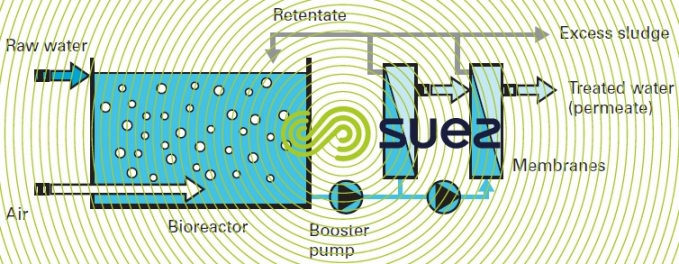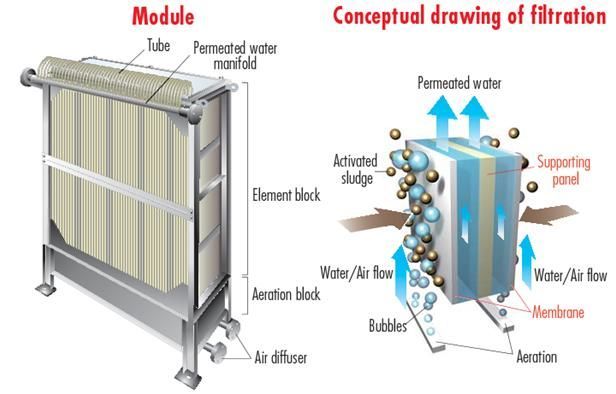The Advantages of Using a Membrane Bioreactor for Efficient Water Purification
The Advantages of Using a Membrane Bioreactor for Efficient Water Purification
Blog Article
The Advantages of Membrane Layer Bioreactors in Lasting Wastewater Administration
Membrane layer bioreactors (MBRs) stand for a pivotal innovation in sustainable wastewater management, efficiently merging biological treatment with sophisticated membrane filtration technology. This integration not only enhances effluent top quality by successfully getting rid of impurities yet additionally opens up opportunities for water reuse in different applications, therefore dealing with the pressing need for source preservation. Moreover, the small design of MBRs contributes to substantial decreases in environmental impact and functional prices. As the demand for lasting options increases, checking out the multifaceted advantages of MBRs might reveal unanticipated ramifications for the future of wastewater treatment systems.
Summary of Membrane Layer Bioreactors
Membrane bioreactors (MBRs) stand for a significant development in wastewater treatment technology, integrating organic deterioration with membrane layer filtration to improve the efficiency of the treatment procedure. This innovative system integrates the advantages of conventional turned on sludge processes with membrane modern technology, enabling enhanced solid-liquid splitting up. MBRs utilize semi-permeable membranes to different cured water from biomass, resulting in top notch effluent that can be reused or safely released right into the environment.
The operational style of MBRs commonly involves a bioreactor where microbes damage down organic issue, complied with by a membrane system that filters the mixed liquor. This setup not just reduces the footprint of the therapy center yet likewise enables higher biomass concentrations and lowered hydraulic retention times. In addition, MBRs are capable of treating a bigger variety of pollutants, including pathogens and nutrients, making them suitable for various applications, from metropolitan wastewater therapy to industrial effluent handling.
The integration of MBRs right into wastewater administration systems is a sign of a growing pattern in the direction of lasting and efficient practices in ecological engineering. Their ability to produce top notch effluent while reducing room requirements placements MBR technology as an essential gamer in contemporary wastewater treatment solutions.
Improved Effluent Top Quality

The membrane filtering process serves as a physical barrier, enabling the retention of microorganisms and particle matter, which adds to a more clear and cleaner effluent (Membrane Bioreactor). MBRs run at higher biomass focus than traditional activated sludge systems, promoting extra efficient biodegradation of contaminants. This results in a decrease in biochemical oxygen demand (BODY) and complete put on hold solids (TSS) levels in the final effluent
In addition, MBRs demonstrate excellent performance in dealing with tough wastewater structures, such as industrial effluents and wastewater with high nutrient lots. Consequently, the effluent created is usually of better, enabling even more flexible disposal options and lowered environmental impact. Ultimately, the improved effluent quality achieved with MBR technology underscores its important function ahead of time lasting wastewater management practices.
Water Reuse Opportunities
The top notch effluent produced by membrane bioreactors (MBRs) opens up considerable possibilities for water reuse in numerous applications. MBRs effectively remove pollutants, including virus, put on hold solids, and natural issue, causing cured water that meets or surpasses regulatory criteria for reuse. This high quality permits the implementation of water recycling efforts across diverse sectors.
One noticeable application is in farming, where dealt with wastewater can be used for irrigation, promoting lasting farming methods while preserving fresh water resources. Furthermore, MBR-treated effluent can be made use of for industrial processes such as air conditioning, cleaning, and as a procedure water resource, substantially lowering the need for drinkable water in these procedures.
In metropolitan environments, MBRs promote making use of redeemed water for landscape irrigation, commode flushing, and various other non-potable usages, adding to the overall strength of supply of water systems. The integration of MBR technology in decentralized systems aids in handling local water needs, particularly in water-scarce areas.
Decreased Environmental Influence
Just how can the fostering of membrane bioreactors (MBRs) contribute to a lowered ecological impact in wastewater administration? MBRs considerably boost the therapy performance of wastewater while minimizing environmental disturbances. By integrating organic treatment procedures with membrane purification, MBRs properly remove a vast array of toxins, consisting of raw material, nutrients, and microorganisms. This advanced purification brings about higher-quality effluent, which is vital for shielding marine environments and lowering the burden on all-natural water bodies.
Moreover, MBRs run at lower hydraulic retention times contrasted to conventional systems, causing smaller sized therapy plant footprints. This small design lowers land usage, thereby preserving all-natural habitats and biodiversity. The procedure also generates less sludge than traditional approaches, minimizing disposal difficulties and reducing greenhouse gas emissions associated with sludge administration.
Additionally, MBRs assist in the recuperation of valuable resources, such as water and nutrients, contributing to a round economic climate. By enabling water reuse for irrigation or commercial processes, MBRs aid alleviate freshwater deficiency, thus promoting lasting water make use of practices. Eventually, the adoption of MBR innovation stands for a substantial stride towards lessening the environmental effect of wastewater administration systems.
Economic Advantages of MBRs

Furthermore, MBRs facilitate the manufacturing of premium effluent, which can great post to read be recycled for different applications, such as farming watering and industrial procedures - Membrane Bioreactor. This reuse ability can significantly reduce water purchase costs, offering a monetary incentive for industries facing rigorous water policies
The portable layout of MBR systems additionally causes minimized land requirements, which is especially useful in city locations where realty is costly. By lessening room, municipalities and markets can save on land purchase and maintenance expenditures.
Additionally, MBRs commonly call for much less regular maintenance and have a longer lifespan than standard you can try here systems, additionally adding to set you back savings. In recap, the economic advantages of MBRs-- ranging from lowered functional costs to land financial savings and effluent reuse-- make them a compelling choice for sustainable wastewater management, supplying both lasting and instant economic benefits.
Verdict
Membrane bioreactors stand for a transformative strategy to lasting wastewater administration, integrating organic treatment with advanced membrane layer purification for superior effluent high quality. Their ability for effective pollutant removal assists in water reuse, thus preserving important freshwater sources. Furthermore, MBRs add to reduced environmental effects via portable layouts and reduced sludge generation. Economic benefits even more improve their stability, making MBRs an encouraging solution for addressing the challenges of wastewater treatment and advertising sustainable source monitoring.
Membrane layer bioreactors (MBRs) represent a pivotal development in sustainable wastewater management, properly combining organic treatment with sophisticated membrane purification modern technology.Membrane layer bioreactors (MBRs) stand for a considerable development in wastewater treatment technology, incorporating biological degradation with membrane purification to boost the effectiveness of the treatment procedure.Accomplishing improved effluent quality is one of the most substantial advantages of using membrane layer bioreactors check over here (MBRs) in wastewater treatment.Additionally, MBRs show exceptional performance in dealing with challenging wastewater compositions, such as commercial effluents and wastewater with high nutrient loads.Incorporating membrane bioreactors (MBRs) right into wastewater administration not only lowers environmental influence however also offers significant financial advantages.
Report this page